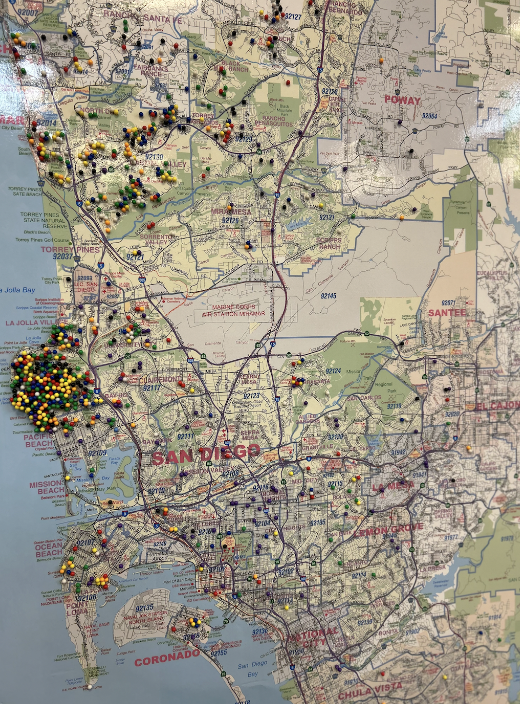Beyond the Bubble
Director of Diversity, Equity, Inclusion & Justice, Mr. Thompson’s map in the DEIJ room is an impressive representation of the commutes of students from Bishop’s and shows where all Bishop’s students live with color-coded pins for grade-levels.
When you live far away from school, time becomes your biggest enemy. Whether that means waking up much earlier, going to sleep later, or not having time to do the things you love, long commutes are a challenge many Bishop’s students face. Although commuting can lead to much tighter schedules, some students have been able to take advantage of the long commutes and even learn to appreciate them.
Senior Raynall Thornton explained that he caught up on homework during his long commute to school. “Because I lose so much time commuting to and from school, I try to be productive while I’m in the car,” Raynall explained. Even a cumulative hour of commuting makes a huge difference in a student’s schedule, and students have learned to use the time in the car in creative ways. Raynall described, “Most of the time I listen to audiobooks for a book I’m reading in English, listen to youtube videos about a historic event I’m learning about in history, or listen to a podcast in Spanish.”
Oliver Morrison (‘25) agreed with Raynall, and explained, “In the car, I’m usually cramming in some homework that I didn’t get done the prior day.” Zoe Yi (‘25) added, “The long car ride usually isn’t bad because I have a significant chunk of time to do homework.” Although homework is one of the most popular ways to be productive in the car, some students disagree.
Sydney Mafong (‘26) said, “with three screaming little siblings right behind you bombarding you with song requests or trying to tell you jokes, homework in the car is nearly impossible.” But doing homework in the car isn’t the only option. Raynall explained that balancing homework or sleep is a challenge and that one always has to be sacrificed, so with a packed schedule, sometimes it is more effective to do things that decrease your stress. Leela Zaveri-Tabb (‘25) explained, “I’ve come to utilize the longer commute, oftentimes to just relax.” Leela also explained how she uses the commute to eat breakfast, and “talk and joke around with [her] family.”
Long commutes lead to less sleep and time to do homework, but living far away from school can affect your social life and doing the things you love as well. “I missed out on a lot of memories just because I didn’t live in La Jolla,” Raynall explained. “My friends would plan something spontaneously, and it would work out for everyone just because they all lived relatively close to one another. For me, however, getting to La Jolla was a whole process… I couldn’t always tag along with my friends.”
This is hard for everyone who lives farther away from school, but especially for younger students that do not have their licenses. Leela added, “I have had to skip things in the past because of how far I live from my peers. Sometimes my parents won’t have enough time to take me all the way there and back.” Making memories with friends is a key point of high school, but with these long commutes, it can’t always happen.
In addition to social life, sports, and extracurricular activities can also be impacted. Gerard Blake (‘24) explained, “all of my time-consuming extracurricular activities died in my high school years.” Gerard loves tennis, but when he went to high school, he realized if he played tennis after school, he would get home at 7:30, “This meant I would go to bed extremely late, and for my own mind, became impossible to do.” It can be challenging trying to fit so much into little time, getting enough sleep for school the next day, finishing homework on time, making time for relaxation, and still having a memorable high school experience. With students at Bishop’s living in roughly 50 zip codes, and more students living outside of La Jolla than inside of La Jolla, these are troubles many students experience.
“For a while, my social life wasn’t the best, along with my mental health, and I was constantly tired,” Raynall explained. Sydney also mentioned that her sleep schedule is really messed up because of the long commute. She explained, “I get so tired on the ride home that I end up napping in the car and not waking up until around 6 p.m.….it’s such a vicious cycle, I’m relying more and more on naps.”
Director of Diversity, Equity, Inclusion & Justice (DEIJ) Mr. David Thompson, asked two students about their schedules, and he explained, “The student who lives in La Jolla said they wake up at 7:45 am and leave at 8:05. The student who takes the bus wakes up at 6:00 am to leave their house at 6:40 to drive to the bus stop. Each student arrives at school on time for advisory in the morning; however one is afforded over an hour of extra sleep in the morning, assuming they each go to bed at the same reasonable hour.”
Although living farther away from school is tough and the commute can be hours long, students love where they live. “I like living in a neighborhood with other Latinos as that creates a sense of community I personally would not find in La Jolla,” Gerard explained. Leela also explained, “Where I live fits me, and over time I’ve begun to appreciate it even more.”
The distances away from school are not all that bad either. Oliver laughed, “If I’m going to a concert or maybe Knott’s Berry Farm or something then finally I get to be the one with a shorter drive.” Leela added, “I don’t have to think as much about seeing people that I know from school at the grocery store, out and about, or in other scenarios like that that I find can be awkward.”
Although waking up earlier and having much less time is stressful, students have learned to appreciate the commute. Raynall explained, “driving this far has become a big part of my life and in a way has made me who I am…I’ve learned to adapt, not complain as much, and just go with the flow of things.” Students have little control of where they live, or as Mr. Thompson suggested, even where they go to school. Raynall concluded “If you asked me a year ago I would likely say I would prefer to live closer. But now, I am content with where I live…it has taught me a lot of lessons.”

Melanie is a junior and Online Editor of The Tower. She’s been on staff for three years and this is her second year on the editorial team, having previously...






